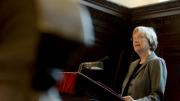President Drew Faust compared the Harvard community to a symphony orchestra—beautiful in the way its diverse parts come together—in her remarks at morning prayers in Appleton Chapel today: an annual presidential tradition that marks the first day of classes.
She began by cataloging the diversity of the more than 6,000 new students entering Harvard classrooms this week. In the College—Faust welcomed its 1,667 freshmen at yesterday’s Convocation—the newcomers represent 69 countries and every state. New students at the graduate and professional schools hail from 122 countries.
For most students, faculty, and staff, Faust reminded her audience, Harvard would be the most diverse community they ever encounter. By coming to Harvard rather than another university or even an online program, she explained, these 6,000 individuals affirmatively chose to join such a diverse place. “Our differences are the foundation of our greatest strength, enabling each of us to grow beyond who we could be alone,” Faust said. “That is the ideal of the symphony. The orchestra would not sound nearly so good if it was just made up of 100 oboes.”
But coming together, she noted, is never the easy choice. She cited recent conflicts around the world that “seem to be tearing peoples apart”—a nod to unrest this summer in places as far away as Gaza and Ukraine, and as near as Ferguson, Missouri. Reminders of the frictions felt by “those who have felt marginalized or unsafe” have played out even closer to home, she said, perhaps referencing two awareness campaigns on campus last spring: “I, Too, Am Harvard,” a play and photo campaign led by African-American students; and “Our Harvard Can Do Better,” a movement to reform the University’s sexual-assault policies.
Though diversity is enriching, Faust said, it “is not something that just happens—without effort, without practice, without difficulties. It is a commitment. It requires work. And the notes we play will not always be perfect.” On this, the first day of the new school year, Faust asked community members to rededicate themselves to that commitment, “to all together performing that Harvard symphony.”
The president’s speech followed the playing of “Festive Processional,” by Carson P. Cooman ’04; a responsive reading of Psalm 92, led by the Reverend Jonathan L. Walton, Pusey minister and Plummer professor of Christian morals; and the choir’s singing of the day’s anthem (“Awake My Heart; Arise My Tongue”). The hymn, which the congregation sang after Faust’s remarks, echoed her message of the power of forming a diverse community: “We gather together to ask the Lord’s blessing.” Read the president’s full text here.









